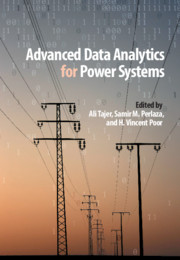Book contents
- Frontmatter
- Contents
- List of Contributors
- Preface
- Part I Statistical Learning
- 1 Learning Power Grid Topologies
- 2 Probabilistic Forecasting of Power System and Market Operations
- 3 Deep Learning in Power Systems
- 4 Estimating the System State and Network Model Errors
- Part II Data-Driven Anomaly Detection
- Part III Data Quality, Integrity, and Privacy
- Part IV Signal Processing
- Part V Large-Scale Optimization
- Part VI Game Theory
- Index
3 - Deep Learning in Power Systems
from Part I - Statistical Learning
Published online by Cambridge University Press: 22 March 2021
- Frontmatter
- Contents
- List of Contributors
- Preface
- Part I Statistical Learning
- 1 Learning Power Grid Topologies
- 2 Probabilistic Forecasting of Power System and Market Operations
- 3 Deep Learning in Power Systems
- 4 Estimating the System State and Network Model Errors
- Part II Data-Driven Anomaly Detection
- Part III Data Quality, Integrity, and Privacy
- Part IV Signal Processing
- Part V Large-Scale Optimization
- Part VI Game Theory
- Index
Summary
Deep learning (DL) has seen tremendous recent successes in many areas of artificial intelligence. It has since sparked great interests in its potential use in power systems. However, success from using DL in power systems has not been straightforward. Even with the continuing proliferation of data collected in the power systems from, e.g., synchrophasors and smart meters, how to effectively use these data, especially with DL techniques, remains a widely open problem. This chapter shows that the great power of DL can be unleashed in solving many fundamentally hard high-dimensional real-time inference problems in power systems. In particular, DL, if used appropriately, can effectively exploit both the intricate knowledge from the nonlinear power system models and the expressive power of DL predictor models. This chapter also shows the great promise of DL in significantly improving the stability, resilience, and security of power systems.
Information
- Type
- Chapter
- Information
- Advanced Data Analytics for Power Systems , pp. 52 - 73Publisher: Cambridge University PressPrint publication year: 2021
Accessibility standard: Unknown
Why this information is here
This section outlines the accessibility features of this content - including support for screen readers, full keyboard navigation and high-contrast display options. This may not be relevant for you.Accessibility Information
- 2
- Cited by
